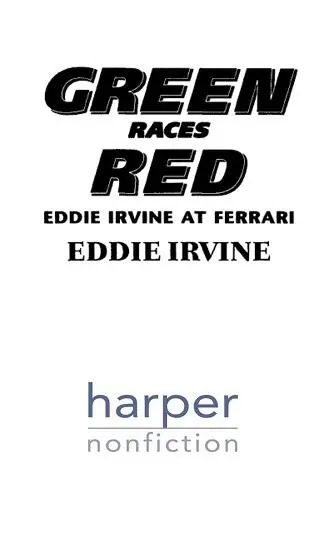
 Copyright
Copyright
HarperNonFiction
A division of HarperCollins Publishers Ltd.
1 London Bridge Street
London SE1 9GF
www.harpercollins.co.uk
First published in hardback in 1996
Copyright © Tidswell Ltd 1996, 1997
Eddie Irvine, With Maurice Hamilton asserts the moral right to be identified as the author of this work
A catalogue record for this book is available from the British Library
All rights reserved under International and Pan-American Copyright Conventions. By payment of the required fees, you have been granted the nonexclusive, nontransferable right to access and read the text of this ebook on-screen. No part of this text may be reproduced, transmitted, downloaded, decompiled, reverse-engineered, or stored in or introduced into any information storage and retrieval system, in any form or by any means, whether electronic or mechanical, now known or hereinafter invented, without the express written permission of HarperCollins ebooks
HarperCollins Publishers has made every reasonable effort to ensure that any picture content and written content in this ebook has been included or removed in accordance with the contractual and technological constraints in operation at the time of publication
Source ISBN: 9780002187633
Ebook Edition © JANUARY 2017 ISBN: 9780007564798
Version: 2017-01-18
To my Mum, Dad and grandparents. Without their support, none of this would have been possible.
Cover
Title Page
Copyright
Dedication
Preface
1 No Big Deal
2 Too Good To Be True
3 Showing My Colours
4 A Couple of Points
5 Formula Ford and Fray Bentos
6 The Gap Grows in Germany
7 A Drop of the Hard Stuff
8 A Bit of a Pain
9 Monaco: Home in a Boat
10 Orient Excess
11 A Bloody Nose
12 Real Bad News
13 A Punishing Schedule
14 Engineering Success
15 Tyre Bashing at Monza
16 What is Damon Really Like?
17 End of Term in Tokyo
18 Into the Second Year
Formula 1 World Championship Results 1996
Formula 1 World Championship Results 1997
Biography
Acknowledgements
About the Publisher
The chapters that follow tell the story of my first two years with Ferrari. But they also look back on my early years in motor racing and touch on the many people who have helped me along the way. I would like to use this book as a means of thanking all the teams for whom I have driven, and everyone who has helped me to get where I am today. There are too many to name individually. They know who they are.
I would also like to thank Jean Todt and the Ferrari team for their assistance and support in producing this book. Thanks also to my publishers, HarperCollins, and to Maurice Hamilton, and Keith Sutton and Allsport, for help with the words and pictures respectively. And I must not forget my sister, Sonia, and manager Rod Vickery, for generally keeping an eye on me and helping things run smoothly.
Eddie Irvine
Jerez, Spain
October 1997
Ask any young racing driver and he’ll tell you that the idea of joining Ferrari means everything. That’s the way I felt while racing in Ireland in Formula Ford. It’s something to dream about when you’re struggling along with few opportunities and even less money. Mention Formula 1 and you automatically think of Ferrari. If a driver gets himself into one of the red cars, he has it made.
But when it actually happens, as it did for me when I joined Ferrari in October 1995, the reality is not so difficult to take on board. The point is, I was not as gobsmacked as I thought I would be.
I don’t know whether it’s because I get used to things quickly or that maybe other drivers exaggerate when joining a new team. In my case, I never regard anything like that as a big deal. And yet there was no doubt that signing for Ferrari had to be the biggest deal of my life.
I felt much the same at the end of the first race of the 1996 season in Australia. I finished on the podium but, to be honest, third place in the Ferrari was not much to write home about. It meant nothing. For me, it’s all about doing a really, really good job – and I didn’t feel I had achieved that in Melbourne mainly because the situation was not there to allow me to do a good job.
Anyone could have brought that car home third; the most significant fact was that the F310 had finished at all. It was a minor miracle after the huge dramas we had gone through in the weeks leading up to the start of the season. At one point, after seemingly endless delays and problems, I never thought we would make it to the first race and, if we did, Ferrari would be totally embarrassed. It just goes to show that you certainly can’t take anything for granted in motor racing.
The previous September, for instance, I was absolutely sure I would be spending a third season with the Jordan team in 1996. I didn’t really want to do that, but there seemed to be no other way because of a watertight contract with the team.
It’s true that team boss Eddie Jordan had given me my chance in Formula 1. He had offered me a drive in the 1993 Japanese Grand Prix at Suzuka and I had taken it. I had spent three years racing in Japan so I knew the circuit well. I had also earned quite a bit of money during my time in the Far East – but Eddie Jordan was not exactly offering a similar reward! It was no big deal in every sense. But I can’t deny that it was a good opportunity to establish my name in Formula 1. I managed to do that at Suzuka – although not quite in the way I had expected.
I finished sixth in my first Formula 1 drive and scored a Championship point. Everyone seemed pretty excited about that, mainly because Jordan had been having a poor season and, with my team-mate Rubens Barrichello taking fifth place, this was the first time the team had scored any points in almost a year. But as far as I was concerned, the real excitement had yet to come.
During the race, I had been challenging Damon Hill for fourth place. The track was in the process of drying out after a heavy shower, Damon had changed to slick tyres and I was on wets, which were definitely the thing to have while the track was still slippery. I wanted to make the most of my knowledge of Suzuka because I knew where there was grip to be found and I wanted to pass Hill while the going was good from my point of view.
Leader Ayrton Senna came past and lapped me, but then instead of doing the same to Damon he seemed to become over-cautious. Damon’s car was sliding around quite a bit and Ayrton was not keen to try and pass. But I was. So I overtook Senna and unlapped myself. It was no big deal … at least, not for me.
It turned out that Senna was mad as hell over that manoeuvre. Nobody had dared to do such a thing to him before. After the race he came down to see me, which was a bit difficult because he wasn’t exactly sure what I looked like. He soon found out, however, and we had a discussion, of sorts.
I explained things the way I saw them; I didn’t feel there was any need to apologise because I had done nothing wrong. The race stewards had seen no reason to take any action but Senna was not impressed. Apparently I had not shown enough respect. Fair enough; that was his point of view. Case closed.
Читать дальше


 Copyright
Copyright










